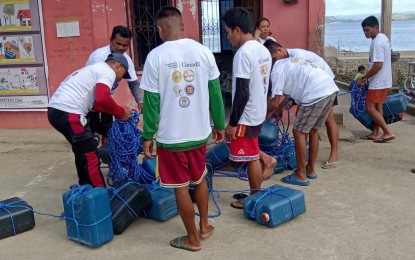
ALTERNATIVE. Fishermen in Daram, Samar, prepare for the installation of long lines for mussel culture. The initiative is an alternative livelihood meant to address overfishing within the marine protected area. (Photo courtesy of Project Azul)
TACLOBAN CITY – A Canadian-funded project has introduced mussel long line to communities in Daram, Samar, as an alternative livelihood meant to address overfishing within the marine protected area (MPA).
A mussel-long line was installed Friday in the Betaug MPA in Betaug village in Daram town, which will provide alternative livelihoods while promoting sustainable marine environmental protection, conservation, and management.
“The project seeks to catalyze the sustainable development of rural, seaside communities,” non-government organization Project Azul said in a statement.
Project Azul is supported by the Canada Fund for Local Initiatives (CFLI), a program designed to support small-scale, high-impact projects in developing countries that align with Global Affairs Canada’s thematic priority areas for engagement.
The project focuses on establishing a micro-blue economy, a concept that emphasizes the responsible and sustainable use of ocean resources for economic growth, improved livelihoods, and ocean ecosystem health.
“This project is not just a significant step for Daram but is poised to set a precedent as a pioneer in the entire country,” the group said.
The group introduced mussel farming as an alternative source of livelihood in the fishing community.
Mussels or "tahong," are bivalve mollusks, meaning they have a two-part hinged shell as an external covering that contains a soft-boiled invertebrate.
Mussel longline is a system of culturing mussels usually composed of a 50-meter rope attached to buoys instead of using bamboo poles. Concrete anchors are placed on both sides of the longline to prevent it from moving.
Mussel spats are placed inside a mussel tied in a 50-centimeter interval. Coconut shells are also attached to act as mussel spat collectors.
Longline is considered environment-friendly and climate-resilient as it can be lowered during a typhoon to prevent damage from big waves.
The project will benefit fisherfolk members, women, LGBTQ+, and other sectors of Betaug and Buenavista villages in Daram town who undergo a three-day training on the installation and management of longline mussel and rock oyster farming.
Also part of the Project Azul implementation was the rapid aquatic resource appraisal by the Samar State University. (PNA)
